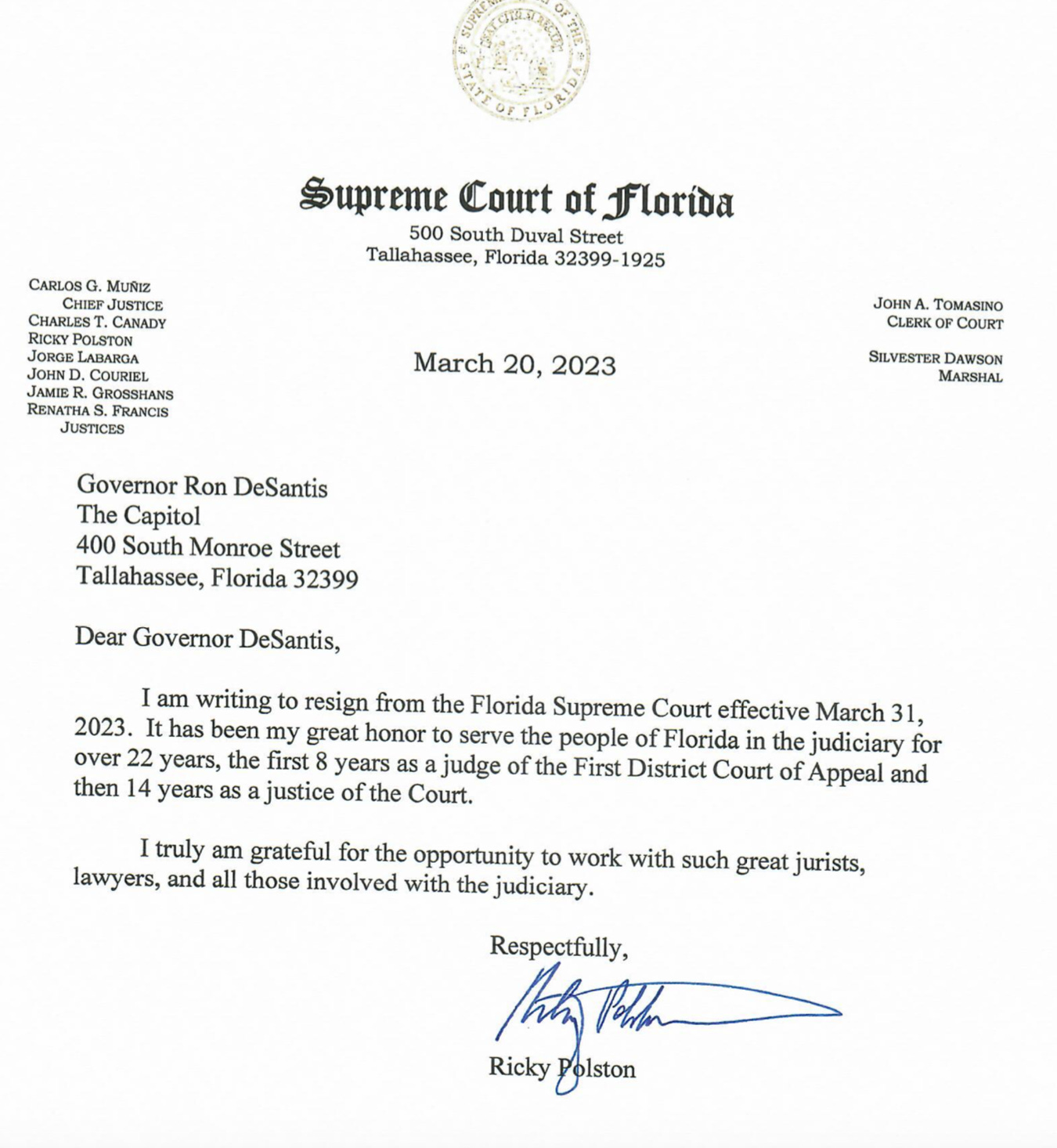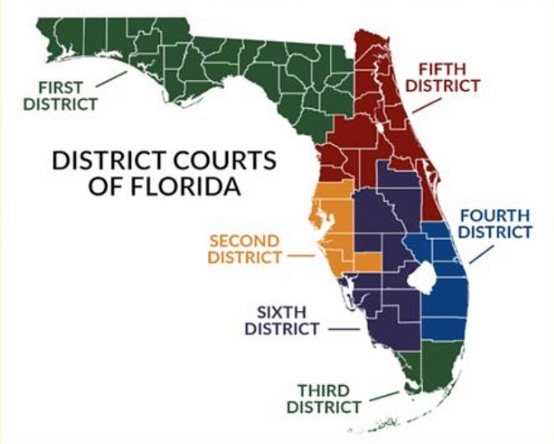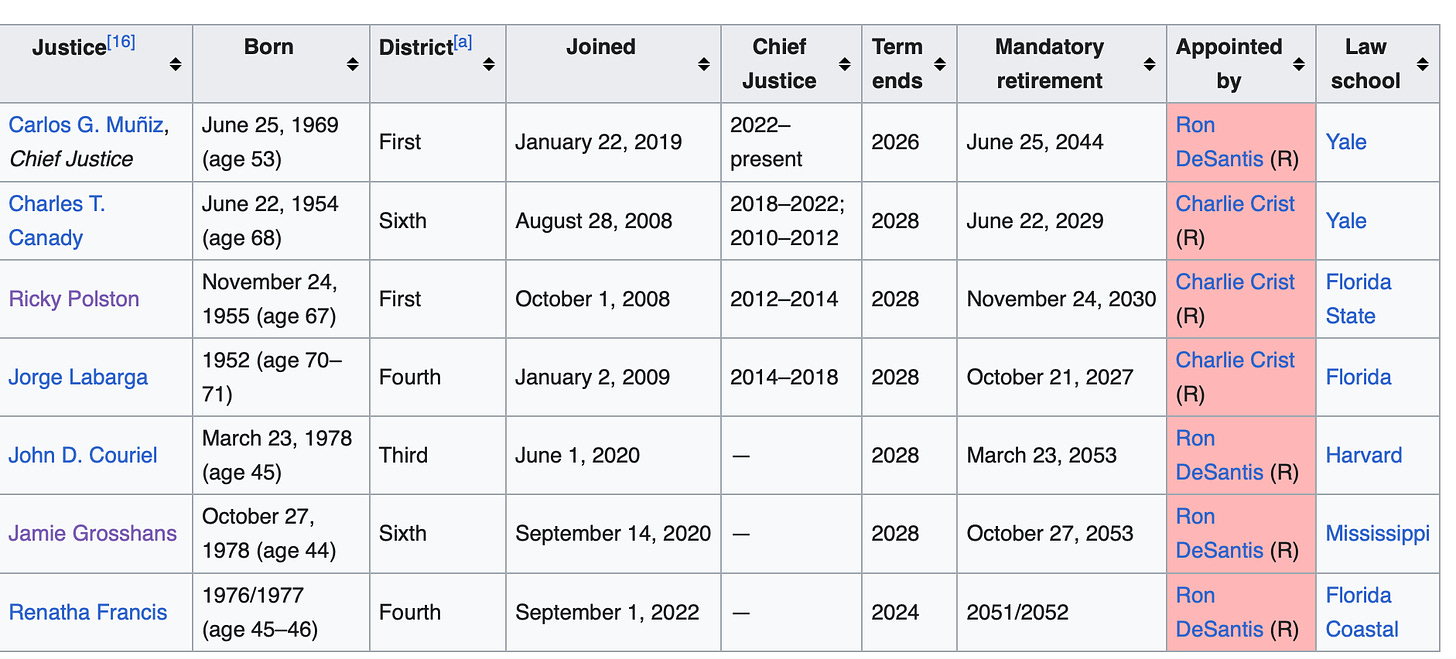Justice Ricky Polston’s last day at the Florida Supreme Court is this Friday, March 31, 2023. Polston joined the court in 2008 after serving on the First DCA. He can “do math,” having worked as an accountant before going to law school. His court bio explains: “Although no longer practicing accounting, he remains a CPA and is a member of the Florida Institute of CPA's and the American Institute of CPA's.” He also has 10 children and “numerous grandchildren,” according to the Florida Supreme Court website. We’re confident Justice Polston knows how many grandchildren he has.
Governor DeSantis’s office has already announced that Polston’s replacement will come from the new Sixth DCA geographic area. Justice Polston was appointed to the supreme court from the First DCA, which comprises the panhandle and north Florida. Chief Justice Carlos Muniz is also from the First DCA geographic area.
With the new Sixth DCA’s creation, some questioned the Florida Supreme Court’s composition because the Sixth DCA “took” Justice Canady’s Polk County from the Second DCA and Justice Grosshans’s Orange County from the Fifth DCA and nobody else on the court represents those districts.
Even the Florida Supreme Court Wikipedia page has a grid of the justices and their district of origin, with an ominous footnote suggesting that 2dca and 5dca are now “unrepresented” orphans.
But the text of the Florida Constitution suggests the Sixth DCA’s birth didn’t throw the Florida Supreme Court into existential crisis:
The supreme court shall consist of seven justices. Of the seven justices, each appellate district shall have at least one justice elected or appointed from the district to the supreme court who is a resident of the district at the time of the original appointment or election.
Art. V, § 3(a), Fla. Const. (emphasis added).
At the time of his “original appointment,” Justice Canady resided in the Second DCA (came off the Second DCA bench, even). And at the time of her “original appointment,” Justice Grosshans resided in the Fifth DCA and came from the Fifth DCA bench.
So while it’s true that the Second and Fifth DCAs have nobody from within their current geographical boundaries on the Florida Supreme Court, the Florida Constitution only requires district residency “at the time of the original appointment or election” of the justice.
We’ll follow the nomination process closely. And we wish Justice Polston the best in his next endeavor.
Gaskin appeals to Florida Supreme Court
Louis Gaskin’s execution is set for April 12. He just lost his postconviction motion at the trial court level and filed his notice of appeal. Briefs are due this week.
None of the four claims are new. His first claim involves his counsel’s failure to present mitigation evidence. But the courts previously held that counsel made a strategic decision not to call a certain mental health expert. His second claim is a Hurst claim—that his 8-4 jury recommendation is unconstitutional. This was raised and rejected in 2018 (because the sentence was final before Ring v. Arizona and not entitled to retroactive relief) and the trial court found no reason to deviate from prior rulings.
Gaskin’s third claim challenges the executive clemency process. The court denied the claim on the merits (“no constitutional right to clemency”) and as procedurally barred. And finally, the court denied Gaskin’s so-called Lackey claim—that his 33 years on death row violate the Eighth Amendment. You may recall that Donald Dillbeck made a Lackey claim during last month’s death warrant litigation.
Dissent in the Districts!
The lone dissent came from Judge May at the Fourth DCA in a dispute between a school district and two charter schools. Judges Conner (majority author) and Levine (special concurrence) held that sovereign immunity didn’t protect the district from the charter schools’ contract claims. Judge May disagreed. After mentioning that this isn’t the case’s first time at the Fourth DCA, she dropped Footnote 4: “I joined the dissent in the en banc opinion. Alas, I was on the losing side of that battle as well.”
And at the Third DCA, Judge Gordo wrote a concurring opinion explaining that she was only joining the majority opinion because she had to under the case law. The case involved an appellate rule change that went into effect while the case was pending. Judge Gordo wrote “to express my concern that our current Florida jurisprudence requires us to qualify the plain language of rule amendments in a confusing and often unintelligible manner.”
This week
We’ll continue to follow the briefs in the Gaskin litigation. And we’ll be watching to see if the Florida Supreme Court has any last minute opinions to release before Justice Polston leaves on Friday.







